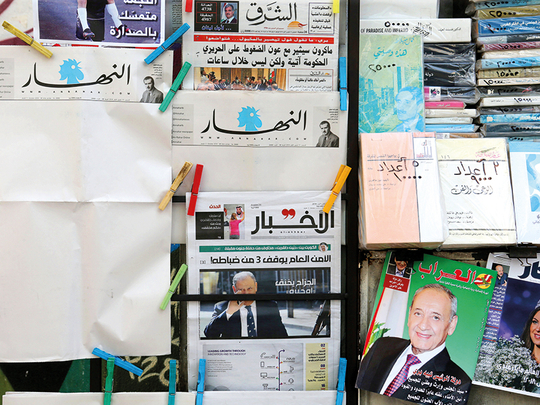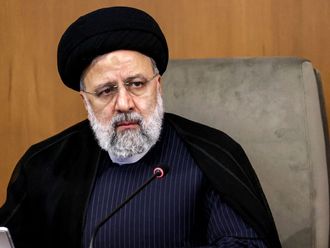
Damascus: Lebanon Parliament Speaker Nabih Berri said earlier on Wednesday that some saw “a positive, promising atmosphere” in talks about forming a new government and his office was engaged in contacts on the issue.
Indeed, this week, there have been signs of a break in the deadlock, which has existed since May this year, when Lebanon held parliamentary elections. One of the stumbling blocks in the talks was expected to be the Special Tribunal for Lebanon (STL), charged with investigating the 2005 murder of former prime minister Rafik Hariri. The STL is expected to issue its final verdict before year’s end.
According to preliminary reports, four members of Hezbollah will be indicted by name — something that should sound like music to the ears of prime minister-designate Sa’ad Hariri, as he had put his weight behind its launch in March 2009, demanding “justice” for his father and the 21 others killed back in February 2005.
If Hezbollah figures are proven guilty of the assassination, all political understanding presently underway between him and Hezbollah might be threatened.
But, those familiar with the talks currently under way in Beirut have told Gulf News that despite his emotional commitment to the truth, Hariri wouldn’t mind if it the verdict gets delayed — at least for now — so that he can save his would-be cabinet from immediate collapse. “Hariri simply won’t give much weight to [the tribunal’s] outcome,” Lebanese analyst Mikhael Awad told Gulf News. “Neither the prime minister nor Hezbollah will take the verdict seriously now.”
Lebanon has been without a government since May’s parliamentary elections, as politicians argue over the formation of a power-sharing cabinet. A sectarian system established after the 1975-1990 civil war has entrenched long-ruling elites and makes it difficult to form a government or agree on major policies.
Fadi Akoum, a prominent analyst, said: “If the verdict is issued before the cabinet is formed, it will somewhat delay the cabinet formation, but the crisis will pass, just like others.” Hariri has no control of the STL outcomes, he added, noting that if it were up to him, he would have preferred postponement “so as not to be seen as partnering in government with those who killed his father”.
In 2016, Hariri reached a deal with Hezbollah, bringing their aging ally Michel Aoun to the presidency, on the condition that he returns to the premiership, from which he had been ejected from back in January 2011, via Hezbollah, with little respect or ceremony.
After last May’s parliamentary election, Hezbollah demanded that it gets 1-2 ministers for its Sunni allies in parliament, known as the Sunni Opposition. Hariri refused, seeking to keep Sunni representation in the hands of his Future Party. After his resistance, Hezbollah caved in, watering down its conditions. In return, Hariri has offered compensating them with the Ministry of Health, currently in the hands of the Christian grouping, the Lebanese Forces. Hezbollah refused, fearing automatic US sanctions on the health sector.
The militant group is now earmarked to keep the two posts it has held since 2016, Industry and Sports, while its allies in the Amal movement will still be getting the portfolios of Agriculture, Finance, and State Development. Hariri is suggesting six seats for the Shiite bloc, which means an additional still-to-be named portfolio, either for Hezbollah or Amal.
Hariri concessions
By giving them six rather than five seats, Hariri is putting them on equal footing with the bloc of his Future Party. In the present caretaker cabinet, Future holds seven seats. For his cabinet to see the light of day, he is willing to give up one seat to Hezbollah or Amal.
Aounist concessions
In return, they have talked their ally, Aoun, into giving up on the post of deputy prime minister, which the LF wants. Aoun was insisting this job is earmarked for the Free Patriotic Movement (FPM) that is headed by his foreign minister and son-in-law, Jibran Basil.
He is the front-man for Hezbollah, said Akoum, claiming that through its alliance with the ageing statesman, the Iran-backed militant group now has control over two-thirds of cabinet posts. “Aoun’s job was to secure a governmental platform for Hezbollah, given that for now, he has the upper hand in naming ministers, thanks to the biggest parliamentary bloc that he controls.”
Hariri is now suggesting 10 seats for the president, both in his official capacity and as founder of the FPM. They presently control 8.
One major reason why the government formation process was stalled was due to the open conflict between the LF and FPM, two historic contenders for pan-Christian representation and leadership in Lebanon.
As he secures his share in the next cabinet, LF President Samir Geagea is also setting his eyes on the presidency, once Aoun’s term expires in 2022, or if he is incapacitated earlier due to old age. A silent rapprochement is underway between the LF and Hezbollah, despite Geagea’s fierce criticism of Syrian President Bashar Al Assad, and his opposition to Hezbollah involvement in the Syrian conflict. Earlier in 2017, Information Minister Melhem Riyashi of the Lebanese Forces visited southern Beirut, Hezbollah’s stronghold, and last month, telephoned a prominent journalist with the party’s television channel Al Manar, checking up on his health. Hezbollah has privately praised the performance of Geagea’s ministers and have not obstructed or vetoed their expanded ambitions in the next Hariri cabinet.
Still problematic is the issue of Druze representation. Traditionally, Druze leader Walid Junblatt has named all three Druze seats, but Hezbollah is asking that one seat goes to its ally, Emir Talal Arslan. Based on these developments, Hariri is expected to present Aoun with his new cabinet setup when the latter returns from Armenia on Friday.
In early October, Hariri hinted that his cabinet would be ready by mid-month. Speaking to MTV, he said: “Everyone must make sacrifices to facilitate the formation of the government, regarding the deputy prime minister’s posts and other issues.”










